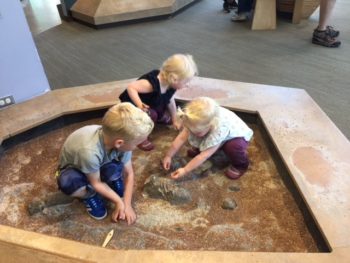 Magnificent Magical Mud
Magnificent Magical Mud
by Mary Ann Burke
INTRODUCTION: GenParenting bloggers will periodically feature select children’s stories with educational and social-emotional growth themes. Magnificent Magical Mud was written to support second grade learners. Students will complete mud science projects and research online informational text to write a mud report.
Why do I love mud?
I have loved mud since I was three years old. I liked the way it squished through my fingers. It was fun to smush my feet in sticky, muddy puddles. Mud was my favorite ingredient for pies and sloshy rock leaf soup. My favorite activity was slinging mud balls at my irritating older brother. Maybe I liked mud because my mom hated mud. Perhaps it was because our backyard became flooded with lots of muddy puddles that I played in whenever it rained. Then my mom would make me change out of my muddy clothes before I stepped into the house.
What is mud?
I was excited when our teacher, Mrs. Hecklebee, asked our class, “What is mud and how do you make it?”
We learned that you can make different types of mud when you mix water with various types of soil. Clay soil is heavy, sticky when wet, and has very fine mineral specks. Sandy soil consists of small pieces of weathered rock and is light and crumbly. Loamy soil has clay, sand silt, and dead plants in it. I was amazed that there were different types of soil that could make mud. I must have used clay soil for great mud pies when I played in my backyard.
Sophia excitedly asked our teacher, “What is the difference between sandy mud and clay mud?”
Then Manuel exclaimed, “Does one type of mud take more water to make? Can you add leaves and branches to make the mud thick?”
My teacher responded to our questions by having us make a quart of clay mud. First, we scooped 4 cups of clay soil into a bucket. Second, we mixed it with a few cups of water to make it stick to our fingers. Finally, we added lots more water to make the mud roll off our fingers.
SIDEBAR HOMEWORK ASSIGNMENT:
Experiment with different types of soil at home. Write down your answers to the following questions:
- What type of soil did you use for your experiment?
- Measure out 1 cup of soil. How many measuring cups of water did you need to make mud that stuck to your fingers?
- How many measuring cups of water did you need to make sloshy mud that rolled off of your hands?
- Did you try this experiment with other types of soil? If yes, what were the differences when using each type of soil?
How do you build a house with mud?
The next day our teacher read us a story about how the Toas Pueblo in New Mexico was constructed using adobe mud bricks.
Mrs. Hecklebee explained, “The brick makers created an adobe mud mixture of sand and clay that was mixed with water and other natural materials for binding, like straw or dung. Then they poured the mixture into large molds. Some workers added cement, asphalt, or other substances to make the bricks stronger. Adobe bricks were dried by the sun, heat, or fire. After the bricks dried, they were removed from the molds. Then the workers laid the bricks with cement mixed with sand on the foundation. Wooden inserts were set between the bricks to hold the frames for windows and doors.”
Our teacher added, “Today’s homes can still use adobe bricks. I recently visited Peru and toured an adobe home in the countryside. Other countries with adobe homes include Costa Rica, Nicaragua, San Salvador, Ireland, and the United States. Adobe homes do not melt away when it rains and are cool to live in due to their insulated composition.”
Mrs. Hecklebee stated, “Different animal and insects might also live in mud houses. For example, mud dauber wasps may build their mud nests on the side of homes. Other living creatures with mud homes include mason bees, American Flamingos, Black-billed Magpies, and mud crabs.”
SIDEBAR HOMEWORK ASSIGNMENT:
Think about different living creatures that might also live in mud houses. Then complete the following activities:
- Draw a picture of the creature living in their mud home.
- Write a sentence describing what the mud home looks like.
Is mud play a sport?
After talking about mud houses, our teacher explained, “Some people like to participate in different types of mud sports. For example, there are obstacle races where people run, crawl, or slide through mud pits, and race onto balance beams or over inflated objects in the mud.”
Sophia eagerly described how her brother participated in a mud wrestling event and said, “He and his friends fought in a mud pit and slipped and slid in the mud as they wrestled with each other. It was so much fun to watch this sport!”
Manuel added, “My dad loves to participate in off road mudding. He drives his 4 x 4 truck with my older brother off the road on muddy mountain trails. Our truck becomes filthy with layers of dried mud.”
I excitedly exclaimed, “Our family likes to ride our mountain bikes after a rain storm. We will speed down a sloshy muddy hill. It is so much fun! My dad has taught me how to relax while pedaling evenly. I must brake early while I steer my bike through a slippery, muddy trail. I have a mud flap on my bike to keep the mud off my face so I can see the trail ahead.”
SIDEBAR HOMEWORK ASSIGNMENT:
Research a mud sport to complete the following project:
- Make a poster about the sport.
- Write a rule to keep people safe when participating in the mud sport.
How do people use mud to take care of their bodies?
I thought that mud was an amazing substance. Not only was it fun to play in and build with, but it was actually good for my health.
During a class discussion, Sonia explained, “My dad used mud packs for aches and pains after running in marathons.”
Jasmine exclaimed, “My mom had a calming spa treatment. She actually put a mud paste on her face to get rid of wrinkles and soaked in a mud bath!”
Manuel added, “My parents went to a Calistoga hot spring in California. They relaxed in a mud bath for about 10 minutes. Then they took a shower and enjoyed a warm mineral water soak.”
Mrs. Hecklebee stated, “Mud therapy can also improve digestion when applying a layer of mud around your stomach. Mud can also cool down the body from heat. It will relax you and can get rid of stress.”
I was surprised to learn that mud used for health purposes is sanitized or cleaned before people use it so that they do not get sick.
SIDEBAR HOMEWORK ASSIGNMENT:
Talk with your parents about how mud is made and its importance in your daily life.
- Ask your parents if they have changed their understanding or their attitude about mud after this discussion.
- Report to your teacher and friends if your parents changed their opinions about the importance of mud.
That night I had a talk with my mom about my mud assignment. The next morning, I ran into the classroom.
I excitedly reported, “After seven years of having my mom yell at me about my muddy messes, she hugged me after our discussion about mud. My mother also reassured me that she now understood how important mud was to my health, happiness, and creativity. Mud truly was a magnificent magical substance!”
Bibliography
Bodine, J. J. (1977). Taos pueblo: A walk through time. Tucson, AZ: Treasure Chest Books.
Bradford, A. (2021, December 22). The Earth&I [Blog]. Retrieved October 4, 2022 from
https://www.theearthandi.org/post/everywhere-but-in-your-eye-the-healing-powers-of-mud.
Brinson, L. C. (n.d.) How adobe construction works. How Stuff Works [Blog]. Retrieved October 3, 2022 from
https://home.howstuffworks.com/home-inprovement/construction/materials/adobe-construction2.htm.
Dewey, J. O. (1998). Mud matters: Stories from a mud lover. Tarrytown, NY: Marshall
Cavendish.
eHow Team. (n.d.) How to build an adobe house. eHow [Blog]. Retrieved October 4, 2022 from
(https://www.ehow.com/how_2125714_build-adobe-house.html.
Ellis, E. (biologist personal communication, October 22, 2022).
Gentry, D. (biologist personal communication, October 19, 2022).
Hewitt, S. (2008). Gems, metals, and minerals. Mankato, MN: Aladdin Books Ltd.
How to do a mud run? Epic mud run ideas below. (n.d.). PARTYGOAT [Blog]. Retrieved
October 4, 2022 from https://partygoat.com/blogs/party-guide/how-to-do-a-mud-run-guide.
Ingrola, L. (2019, April 3). Retrieved from
https://www.yesmagazine.org/issue/dirt/2019/04/03/science-mud-healing-power.
Kapur, S. (n.d.) Types of soil. BYJU’S: The Learning App [Blog]. Retrieved October 2, 2022,
from https://byjus.com/biology/types-of-soil/#sandy-soil.
Kimura, S. (biologist personal communication, October 22, 2022).
Laue, C. (n.d.). 5 top tips for mastering mud. (n.d.). Retrieved October 4, 2022 from
https://www.redbull.com/us-en/how-to-ride-in-mud-5-essential-mtb-tips.
Marabito, M. (2022, March 11). Are adobe houses sustainable? Treehugger [Blog]. Retrieved
from https://www.treehugger.com/are-adobe-houses-sustainable-5116189.
Morgan, J. (n.d.) 14 birds that make must nests. BirdWatching Buzz [Blog]. Retrieved October 4,
2022 from https://birdwatchingbuzz.com/14-birds-that-make-mud-nests/.
Mud wrestling rules. (n.d.). Retrieved October 4, 2022 from
https://jellowrestlingsupply.com/mud-wrestling-rules.
National Center for Families Learning. (n.d.) What insect builds a mud nest? Wonderopolis
[Blog]. Retrieved October 4, 2022 fromhttps://wonderopolis.org/wonder/what-insect-builds-a-mud-nest.
Quentin Wilson and Associates. (n.d.) Localities where adobe works. Greenhomebuilding
[Blog]. Retrieved October 3, 2022 fromhttps://www.greenhomebuilding.com/QandA/adobe/localities.htm.
Sather, P. (2021, October 25). 6 birds that make mud nests. A-Z Animals [Blog]. Retrieved from
https://a-z-animals.com/blog/6-birds-that-make-mud-nests/.
Surprising health benefits of mud therapy. (2019, August 9). India Times [Blog]. Retrieved from
The WellBeing Team. (2022, January 14). WellBeing [Blog]. Retrieved from
https://www.wellbeing.com.au/body/health/mud-marvellous-mud-html.
Tian, X., Zhang, Y., Li, H., Jiao, Y., Wang, Q., Zhang, Y., Ma, N., & Wang, W. (2022, March
7). Property of mud and its application in cosmetic and medical fields: a review. Springer, NCI
CPTAC Assay Portal. Retrieved from https://pubmed.ncbi.nlm.nih.gov/35254605/.
Top US off-road destinations. (n.d.). Retrieved October 4, 2022 from
https://www.travelchannel.com/interests/outdoors-and-adventure/photos/top-us-off-road-destinations.
Vanderlinden, C. & Leverette, M. M. (2022, October 1). Understanding clay soil and how to
improve it. The Spruce [Blog]. Retrieved from
https://www.thespruce.com/understanding-and-improving-clay-soil-2539857.
Young, B. E., Schweitzer, D. F., Sears, N. A., and Ormes, M. F. (2015, September).
Conservation and management of North American Mason Bees. Arlington, VA: NatureServe.
Retrieved from https://www.natureserve.org/publications/conservation-and-management-north-american-mason-bees.

Mary Ann Burke, Ed.D., Digital Education Expert, is a substitute distance learning teacher for Oak Grove School District in San Jose, California and the author of STUDENT-ENGAGED ASSESSMENT: Strategies to Empower All Learners (Rowman & Littlefield: 2020). Dr. Burke creates digital language arts and substitute teaching K – 12 activities for teachers and parents. She is the Cofounder of the Genparenting.com blog. Burke is the former Director II of Categorical & Special Projects for the Santa Clara County Office of Education that supports 31 school districts serving 272,321 students in Santa Clara County. She is also a previous Director – State & Federal Compliance for Oakland Unified School District, the former Director – Grantwriter for the Compton Unified School District, and was the initial VISTA Director for the Community Partnership Coalition in southern California. Much of her work focuses on creating innovative digital trainings and partnership programs for teachers and families to support students’ learning. These programs were featured as a best practice at a National Title I Conference, California’s Title I Conferences, AERA Conferences, an ASCD Conference, the NASSP Conference, and statewide educator conferences.

